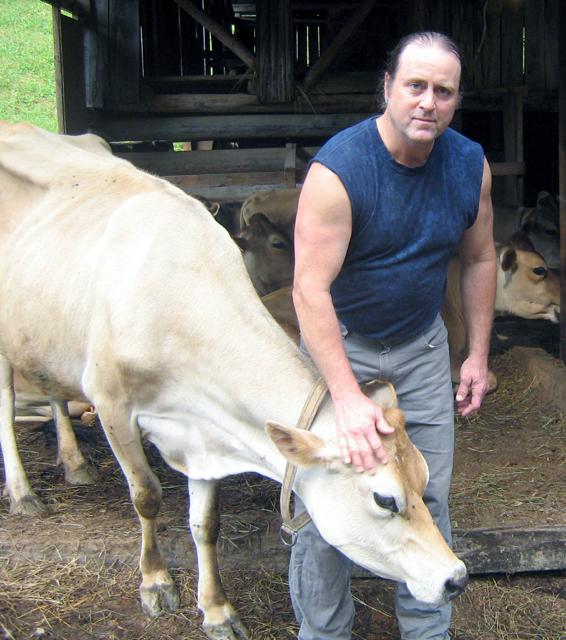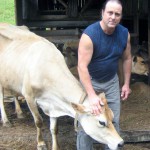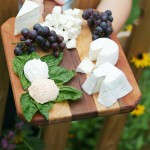- Till the cows come home: Bruce DeGroot with Silverbell, one of Yellow Branch’s milking cows. “I’m in this because I enjoy being involved in animal agriculture. I really enjoy the cows,” DeGroot says. Photos courtesy of Yellow Branch Pottery and Cheese.
- The big cheese: Looking Glass Creamery turns out a variety of cheeses, including mozzarella, feta and bloomy-rind semi-soft cheeses.
Western North Carolinians may not don foam cheese hats at Tourists’ games, but we’re a cheese-loving and cheese-making region all the same. That’s why Appalachian Sustainable Agriculture Project is putting the focus on local farmstead cheese this month in its Get Local initiative, which brings together farmers, chefs and community members to celebrate a single seasonal ingredient.
In fact, we’re so steeped in appreciation for our local cheese makers that it may be difficult to imagine a time when no one had heard of local, handcrafted cheeses. But, that was the landscape not too long ago. “We’ve been licensed since 1986,” says Bruce DeGroot of Yellow Branch Pottery and Cheese in Robbinsville. “At that time, the idea of artisan cheeses practically didn’t exist.”
DeGroot and his partner, Karen Mickler, actually started making cheese for themselves a few years earlier. “We got our first cow in ’81,” Bruce says, adding, “After she calved the first time, we had more fluid milk than we knew what to do with, and Karen started making cheese for us.”
In the ‘80s, the term agritourism just wasn’t used, but Bruce and Karen were onto something there as well. Around the same time they began experimenting with cheese making, Bruce built a space for Karen to house her original passion, pottery. “It just occurred to us that we might be able to do something with our milk, to create another product we could sell wholesale,” he says. “The pottery building was conceived as a showroom, and we were already trying to get people to come visit. We thought, this might just work.” And it has.
Yellow Branch started out making roughly 1,000 pounds a year of their signature cheese, a recipe developed after Karen took cheese-making courses in Canada and Wisconsin. Several years later, artisan cheeses became a full-fledged thing, sought after by connoisseurs and general consumers alike (a boom that, according to Bruce, began at the end of the ‘90s). Now, Yellow Branch milks five cows to produce more than 6,000 pounds a year.
Karen’s pottery has also taken off, and Bruce has assumed all cheese-making duties — of course, honoring Karen’s recipe. “We make what we consider an original cheese, which is Yellow Branch Farmstead. It gets compared to cheddar and havarti,” he says, noting that while it may share some properties with those standards, it speaks for itself.
But, Bruce has put his own spin on things. He now creates a pepper-and-basil version of their original — with pepper and basil he grows himself — and creates a natural-rind cheese, aged without wax for a minimum of 120 days. And he’s got more up his sleeve. “I’m bringing online some natural rinds aged longer, a year or two years. The two-year is almost like a Parmigiano-Reggiano.”
He’s also working with Heinzelmännchen Brewery in Sylva to create beer-infused and soaked options.
Area cheese makers’ willingness to experiment excites our local chefs. “It’s amazing the variety we have,” says Peter Pollay, executive chef and owner of Posana Café in downtown Asheville. “We speak with our producers at least once a week, if not more. They’re telling us what is at the best ripeness, what is at the best point in the aging progress, or you really should have a cheese this week. We’re even in a position to say we want them to make a cheese with a certain mixture of milk because those are the flavors we really like. It’s pretty much a chef’s dream.”
Pollay says these relationships have gotten stronger and stronger. Shortly after ASAP’s Marketing Opportunities for Farmers (MOFF) conference, held at Warren Wilson College in late February, he was able to fill Posana’s cheese plate with entirely locally produced cheeses. And, he’s well on his way to featuring all local cheeses in all of the salads on his menu.
While farmstead cheese lends itself to many dishes, Pollay likes it best “alone, to get the full flavor from the cheese itself and the milk the producers use.” He adds, “Of course, a glass of wine goes really well with it.”
Cheese and Winesdays
ASAP is the Wine Studio of Asheville’s featured nonprofit for April at their Winesday events — opportunities for area wine lovers to get together, socialize and try new wines. In honor of Get Local’s farmstead cheese focus this month, it’s also a chance to sample the artisan products of our area’s talented cheese makers. One dollar from each attendee’s $5 ticket benefits ASAP.
Looking Glass Creamery kicks off the month, on April 6, followed by Three Graces Dairy (April 13) and Spinning Spider Creamery (April 20) — all three of which Pollay sources. Yellow Branch cheeses close out the month on April 27. In addition to offering samples, cheese makers will sell their products so that you can recreate the pairing you loved in the store, located at 169 Charlotte St. The events are held from 5-8 p.m.
For more information about Winesdays, visit winestudioasheville.com. And find a list of all participating Get Local eateries, plus more information about ASAP’s initiative, at asapconnections.org/getlocal.html.
To learn more about Yellow Branch Farmstead Cheese, visit yellowbranch.com, or call 479-6710. Posana Café is located at 1 Biltmore Avenue in downtown Asheville and can be reached at 505-3969, or found on the web at posanacafe.com. To find more information on the other cheese producers mentioned here, and even more located around the region, visit ASAP’s online Local Food Guide at buyappalachian.org and search by product.
— Maggie Cramer is the communications coordinator at Appalachian Sustainable Agriculture Project (asapconnections.org). Contact her at maggie@asapconnections.org.





Before you comment
The comments section is here to provide a platform for civil dialogue on the issues we face together as a local community. Xpress is committed to offering this platform for all voices, but when the tone of the discussion gets nasty or strays off topic, we believe many people choose not to participate. Xpress editors are determined to moderate comments to ensure a constructive interchange is maintained. All comments judged not to be in keeping with the spirit of civil discourse will be removed and repeat violators will be banned. See here for our terms of service. Thank you for being part of this effort to promote respectful discussion.